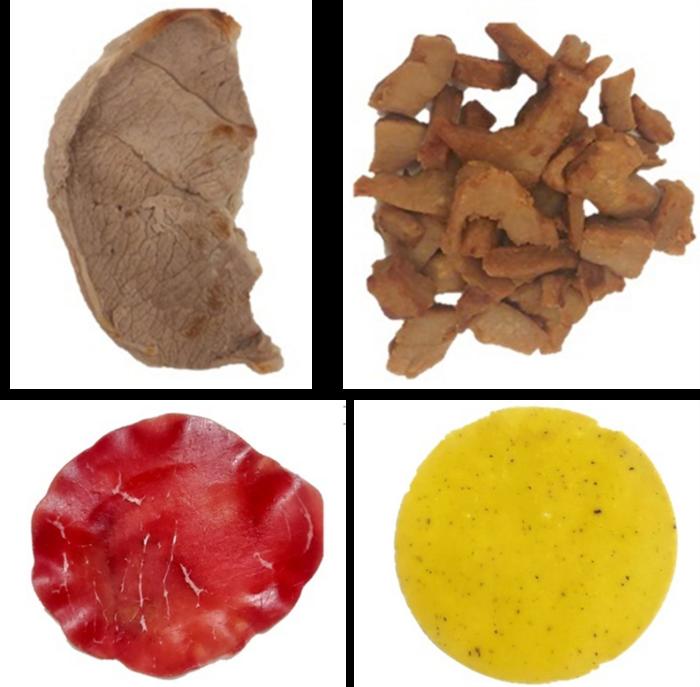Many plant-based meats have seemingly done the impossible by recreating animal products ranging from beef to seafood. But beyond just the taste and texture, how do these products compare to the real thing in nutritional value? A small-scale study published in ACS’ Journal of Agricultural and Food Chemistry shows that while some “plant steaks” and “plant cold cuts” might be comparable to meats on some fronts, their amino acid content and protein digestibility fall short.

Credit: Adapted from Journal of Agricultural and Food Chemistry 2024, DOI: 10.1021/acs.jafc.3c08956
Many plant-based meats have seemingly done the impossible by recreating animal products ranging from beef to seafood. But beyond just the taste and texture, how do these products compare to the real thing in nutritional value? A small-scale study published in ACS’ Journal of Agricultural and Food Chemistry shows that while some “plant steaks” and “plant cold cuts” might be comparable to meats on some fronts, their amino acid content and protein digestibility fall short.
Meat-free burgers or ground beef mimics might come to mind first, but the options for plant-based alternatives have expanded to include whole cuts of meat resembling steaks and chicken breasts, as well as sliced cold cuts like salami or bresaola — a type of cured beef. While these newer products haven’t been studied as extensively as burger-style products, they are becoming more widespread and popular among consumers. As a result, it’s important to understand how they differ nutritionally from the meats they aim to replicate and replace. In other words, how well do our bodies digest and gain nutrition from these foods? Tullia Tedeschi and colleagues wanted to answer that question by comparing the protein quality, integrity and digestibility of a set of plant-based steaks and cold cuts to their meat counterparts.
The team, based in Italy, collected three different plant-based steaks and three different plant-based cold cuts. Veal steaks were used as a comparison point for the plant steaks, whereas ham and beef cold cuts were compared to their respective plant-based substitutes. The fat, salt and protein content of each was measured, then the samples underwent a simulated digestion in the lab to understand how well the proteins break down in a human’s digestive tract.
- The plant-based products contained more carbohydrates, less protein and reduced amino acid content than their meat-based counterparts.
- Plant steaks and the veal samples were comparable in terms of essential amino acid content and digestibility.
- Plant cold cuts generally had less salt than the meats and contained fewer essential amino acids. Different products also showed differing levels of digestibility due to the variety of ingredients they contain.
Overall, the nutritional value of the plant-based products depended greatly on the plants used to create them, causing wide variation in their amino acid content and the digestibility of their proteins. In contrast, all the samples within a particular meat type showed comparable nutritional profiles. The researchers say that this work helps demonstrate that careful consideration should be taken when replacing meat products with plant-based alternatives, and that these differences in nutritional profile should be communicated to consumers to allow for informed decisions.
The authors acknowledge funding from the Emilia Romagna Region of Italy for this work.
###
The American Chemical Society (ACS) is a nonprofit organization chartered by the U.S. Congress. ACS’ mission is to advance the broader chemistry enterprise and its practitioners for the benefit of Earth and all its people. The Society is a global leader in promoting excellence in science education and providing access to chemistry-related information and research through its multiple research solutions, peer-reviewed journals, scientific conferences, eBooks and weekly news periodical Chemical & Engineering News. ACS journals are among the most cited, most trusted and most read within the scientific literature; however, ACS itself does not conduct chemical research. As a leader in scientific information solutions, its CAS division partners with global innovators to accelerate breakthroughs by curating, connecting and analyzing the world’s scientific knowledge. ACS’ main offices are in Washington, D.C., and Columbus, Ohio.
To automatically receive news releases from the American Chemical Society, contact [email protected].
Note: ACS does not conduct research, but publishes and publicizes peer-reviewed scientific studies.
Follow us: X, formerly Twitter | Facebook | LinkedIn | Instagram
Journal
Journal of Agricultural and Food Chemistry
DOI
10.1021/acs.jafc.3c08956
Article Title
“Assessment of Protein Quality and Digestibility in Plant-Based Meat Analogues”
Article Publication Date
1-Apr-2024




